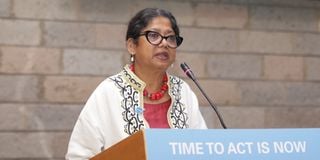Premium
‘As a woman, there’s pressure to constantly lead and excel on all fronts’

Shaheen Nilofer, UNICEF's Representative to Kenya.
What you need to know:
- Nilofer has over 30 years of experience in the development sector.
- She holds a Doctorate in Gender Studies and a Master’s in Sociology.
What's the most prized possession in your office?
I enjoy the view outside my office the most. I find it inspiring and limitless, which resonates with my personality.
My first name means a falcon, whereas Nilofer means a water lily. It's like you fly high, gallop, and fall like thunder in the water.
Your work demands lots of travel to different countries. How have the diverse experiences shaped you as an individual?
It has broadened my worldview significantly. You know, I was born and brought up in a small town in India. And, when you grow up in such an environment, your world is very limited in itself.
Your relationships, your network, your families, and your group of friends. This job has exposed me to different cultures, political systems, and developmental challenges.
All these experiences have made me more understanding and appreciative of diversity.
What’s the toughest part of settling into a new country, especially as a career woman?
I think I've grown into this role, as this is my fourth representative's role, and while I might seem to dive headfirst into new jobs, honestly, it wasn’t always this way.
In my initial career progression, there was extra pressure and the burden to prove a point. You know, I am here, I have arrived.
And I realised that it’s extremely burdensome especially when you are a woman because you are often put under surveillance.
People are going to put you on a test; they want to see how you’re doing, how you’re able to manage the issues, conflicts, and all of that.
But as you grow into roles, you realise that everything has its own time to address it. Over time, throughout these different jurisdictions, I've learned there’s no need to rush in to prove yourself.
In basketball, there’s an interesting saying: “Lead with your offhand.” Whether you’re right or left-handed, it means developing your weaker side to become more well-rounded.
Just like in basketball, as a woman, there’s the pressure to constantly ‘lead’ on all fronts – excelling in every area and being visible everywhere.
And that's an unnecessary pressure that you put on yourself. But later in my career, I didn't necessarily think that was this important.
If you could tell me, drawing from what you've just said, you often travel alone, and your family still lives in India, how do you adjust to new postings, say the one in Kenya, with your family not around?
You know, it has both sides to it. The better part of it is that you go and start your work without having to think about family logistics.

Shaheen Nilofer is UNICEF's Representative to Kenya.
But the downside is you feel very lonely in the initial days, and it takes time to make friends. Work can easily become your whole world.
Thirty years in senior leadership positions is quite a long time. What has helped you to stay in those positions?
When I reflect on my career path, it fills me with immense gratitude. It's been a journey of muddying my boots and soiling my hands, literally.
I value those experiences very much because I understand the ground reality very well, from the development nuances to the interface between politics and development. I have worked in countries like Afghanistan, countries in South Asia, Central Asia and now, in Africa.
I have seen the vast spectrum of developmental challenges across continents. The way the governments run, the geopolitics, the macroeconomics, and the situations there. These experiences have been extremely helpful for me.
What do you love most about Kenya?
I love travelling in this place. And I love the sheer green. This is one very beautiful country.
What career advice would you give to those seeking to climb up the career ladder?
Never give up too early. Because I know as a young professional woman, there are a lot of obligations that you will face. And sometimes it can take you on a guilt trip.
You know, like you are neglecting your family and other responsibilities. I say, embrace it but don’t let it hold you back.
Notably, this applies in many ways to men too. Importantly, take every roadblock as an opportunity to grow, and enjoy what you're doing.
What does tomorrow look like for a child in Kenya, and in any other part of the world?
Primarily, I do see there's a lot of hope and optimism. It is about ensuring that we come together because the time to act is now.
And we just have about barely five to six years before we hit the finishing line to the Sustainable Development Goals (SDGs)2030.
I strongly believe that it is a doable proposition, and Kenya will be able to achieve its commitment to SDGs for children, if we can bring in our collective efforts, both in terms of our resources, ensuring that the fund flow for those commitments, and the budgetary allocations for the children are sustained.





